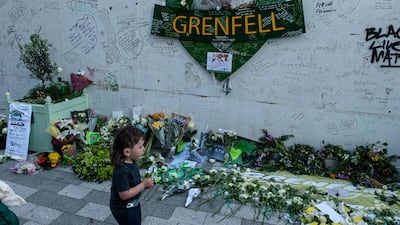A Syrian refugee cried out for his mother over the phone in the moments before he died after falling 14 floors from the burning Grenfell Tower, an inquiry has heard.
Mohammad Alhajali, 23, moved to the UK in 2014 and was studying civil engineering while working part-time in North Kensington in London, where he had sought a better life and was due to be married.
Born in Damascus and the second eldest of five children, Alhajali had lived in Leeds, West Yorkshire, before moving to flat 112 on the 14th floor of the tower block with his brother, Omar Alhajali, in September 2016.
His other brother, Hashem, who also lived in London, was the last person he spoke to on the phone before he died.
Evidence is being heard at the public inquiry into the inferno, which killed 72 people and destroyed Grenfell Tower on 14 June, 2017.
Alhajali’s parents and two sisters lived in Syria, and the Grenfell Tower Inquiry heard that he had “dreamt one day he would be able to bring his family together in one place where they would be able to settle and live their best life”.
Instead, it is believed he saw two of his neighbours die slowly in a flat where he had been told to wait for firefighters — who never returned — before trying to escape from a window and plunging to his death.
Omar had been escorted to safety by firefighters at about 2.30am. The inquiry heard that he had pleaded desperately with them to return for the residents still trapped inside, but, due to botched instructions from commanders, they did not.
Danny Friedman QC spoke on behalf of the family at the inquiry on Thursday.
Describing Alhajali’s final moments at about 4am, Mr Friedman said: “Hashem describes Mohammad by this time as speaking very slowly, like he had lost all energy.
“He told Hashem that the other people in the flat had stopped responding to him.
“Mohammad was crying and asking to speak to their mother, but Hashem was scared that if he hung up he would not be able to get through to him again.
“Hashem played the Quran to him from a speaker on his phone.
“Mohammad suddenly said ‘The fire is here, I can see the fire’. That was the last thing Hashem heard him say.
“Hashem then heard the sound of cracking, which he interpreted to be the sound of the fire, and the line broke off.”
Mr Friedman described the ordeal from the perspective of Alhajali’s parents.
“In 2014, Mr and Mrs Alhajali sent their sons to a safe country, away from Syria, to avoid the perils of civil war," he said.
“Two years later, one of their sons was dead, the other endured a highly traumatic near-death experience, and the third conducted a last call with Mohammad, desperately trying to convince his brother to escape.
“Mohammad was the first victim of the fire to be buried, in accordance with Muslim rights and by virtue of immense support by the East London Mosque.”
Mr Friedman said Alhajali had been described by friends as “an unusually charismatic person, much-loved for his selflessness, compassion and strength of personality”.
“In his kindness and his many other qualities, Mohammad and his brothers and friends, who this inquiry has heard from, all represent the very best of those forced to leave their homes to start a better life," he said.
“These are exceptional people and we are so sorry that they have lost someone in Mohammad, who was so loved and special to them.”
The inquiry continues.


















